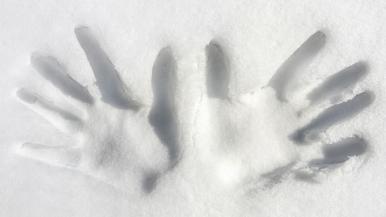When snowflakes swirl and Chicago's wind chills to the bone, warm woolen mittens may top your list of favorite things. But when the mitts come off and you're still offering a cold handshake, you might wonder what's wrong — and what you can do about it.
Many people just have naturally cold hands, according to Winston Sequeira, MD, a rheumatologist at Rush. In fact, he says, up to 15 percent of women report having them. Only rarely do those frosty fingers signal a problem.
"People can have cold hands for a variety of reasons," says Sequeira. "Most commonly the underlying cause is vascular — that is, relating to blood vessels."
Whatever the cause, when blood flow to the hands is diminished, a cold feeling sets in. To help people know when to consult a doctor, Sequeira offers hard facts about what causes cold hands.
Out in the cold
"When we go out in the cold weather, our blood vessels spasm to prevent heat loss from the body," says Sequeira. "In some individuals, this spasm occurs when they are exposed to cool temperatures that wouldn't bother most people — sometimes just an air-conditioned room — and their fingers turn white, then blue, then red. This is called Raynaud's phenomenon."
Causes of Raynaud's range from vascular damage to lupus, and doctors at Rush may offer several treatment options.
For mild cases — when fingers turn white or blue but aren't painful — they might first recommend wearing gloves, as well as quitting smoking, since smoking may aggravate Raynaud's. It is also important to avoid drugs that can cause spasm of the blood vessels, such as decongestants and diet pills.
If those measures don't work or symptoms worsen, medication may be an option. According to Sequeira, most patients' symptoms can be controlled by medications. For those with severe disease and ulceration of the fingertips, surgery is an option.
Too cold for comfort — or safety
Chicago winters bring a particularly dangerous threat to cold hands: frostbite. When low temperatures severely restrict the blood supply and freeze the tissue in inadequately protected hands, the damage is extremely painful and, if left untreated, irreversible. Frostbite requires immediate emergency medical care.
For cold hands not caused by frostbite, Sequeira offers this advice: "If your hands are cold and turn colors — white or blue — see your primary care doctor. He or she should be able to rule out some causes and recommend an appropriate specialist, if needed."
People can have cold hands for a variety of reasons. Most commonly the underlying cause is vascular — that is, relating to blood vessels.
Other causes
Sequeira notes there are other possible culprits your doctor will want to consider, including the following:
- Anemia. In this common blood disorder, lack of oxygen in the blood can lead to cold hands.
- Blood clot. If a blood clot travels to an artery supplying an arm or leg, it could cause the sudden onset of cold or pain. This is an emergency, and you should call 911 immediately.
- Certain drugs. In people who are susceptible to blood vessel spasms, drugs (including amphetamines, some cancer medications and decongestants) might affect blood flow to the hands.
- Hypothyroidism. An underactive thyroid can slow the metabolism and cause a decrease in body temperature.
- Peripheral vascular disease (PVD). In this condition, restricted blood flow caused by narrowing of the arteries could result in cold limbs.
- Peripheral neuropathy associated with diabetes. Poor circulation and loss of feeling in the hands can cause people with diabetes not only to have cold hands, but also to fail to realize when cold temperatures are endangering their hands.
- Stress. When adrenalin surges as the result of stress, it can cause blood vessels to constrict, decreasing blood flow and making hands feel cold.




